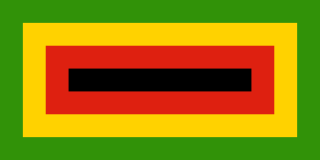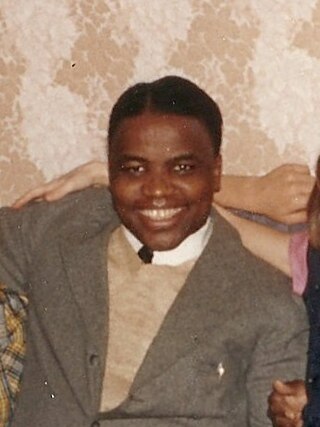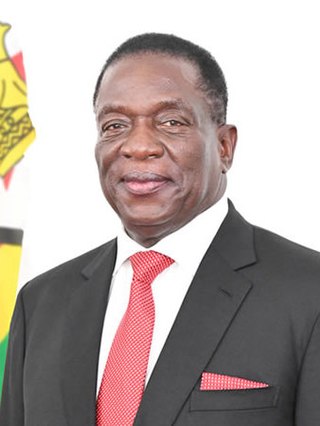
The Zimbabwe African National Union – Patriotic Front (ZANU–PF) is a political organisation which has been the ruling party of Zimbabwe since independence in 1980. The party was led for many years under Robert Mugabe, first as prime minister with the Zimbabwe African National Union (ZANU) and then as president from 1987 after the merger with the Zimbabwe African People's Union (ZAPU) and retaining the name ZANU–PF, until 2017, when he was removed as leader.

The Zimbabwe African National Union (ZANU) was a militant socialist organisation that fought against white-minority rule in Rhodesia, formed as a split from the Zimbabwe African People's Union (ZAPU) in 1963. ZANU split in 1975 into wings loyal to Robert Mugabe and Ndabaningi Sithole, later respectively called ZANU–PF and ZANU–Ndonga. These two sub-divisions ran separately at the 1980 general election, where ZANU–PF has been in power ever since, and ZANU–Ndonga a minor opposition party.

Ndabaningi Sithole founded the Zimbabwe African National Union (ZANU), a militant organisation that opposed the government of Rhodesia, in July 1963. Sithole was a progeny of a Ndau father and a Ndebele mother. He also worked as a United Church of Christ in Zimbabwe (UCCZ) minister. He spent 10 years in prison after the government banned ZANU. A rift along tribal lines split ZANU in 1975, and he lost the 1980 elections to Robert Mugabe.

Zimbabwe African National Union – Ndonga is a minor political party in Zimbabwe. Its members were originally part of Zimbabwe African National Union, but split with what would become ZANU–PF over tribal tensions. A portion of the party reunified with ZANU-PF in 2015.
Jonathan Nathaniel Mlevu Moyo is a Zimbabwean politician who served in the government of Zimbabwe as Minister of Higher Education from 2015 to 2017. He was previously Minister of Information and Publicity from 2000 to 2005 and again from 2013 to 2015. He was elected to the House of Assembly of Zimbabwe as an independent candidate in 2005 and 2008. He is considered the core architect of the AIPPA and POSA restrictive legislation.

Parliamentary elections were held in Zimbabwe on 31 March 2005 to elect members to the Zimbabwe House of Assembly. All of the 120 elected seats in the 150-seat House of Assembly were up for election.

Edgar Zivanai Tekere, nicknamed "2 Boy", was a Zimbabwean politician. He was the second and last Secretary General of the Zimbabwe African National Union (ZANU) who organised the party during the Lancaster House talks and served in government before his popularity as a potential rival to Robert Mugabe caused their estrangement.

Arthur Guseni Oliver Mutambara is a Zimbabwean politician. He became the president of the Movement for Democratic Change (MDC) in February 2006. He has worked as a director and CEO of Africa Technology and Business Institute since September 2003. Under a September 2008 power-sharing agreement, Mutambara served in the government as one of two Deputy Prime Ministers from 2009 to 2013.

Emmerson Dambudzo Mnangagwa is a Zimbabwean politician who has served as President of Zimbabwe since 24 November 2017. A member of ZANU–PF and a longtime ally of former President Robert Mugabe, he held a series of cabinet portfolios and was Mugabe's Vice-President until November 2017, when he was dismissed before coming to power in a coup d'état. He secured his first full term as president in the disputed 2018 general election.

Parliamentary elections were held in Zimbabwe in June and July 1985. The result was a victory for the ruling ZANU–PF party led by Robert Mugabe, which increased its majority in parliament.

Joseph Wilfred Msika, was a Zimbabwean politician who served as Second Vice-President of Zimbabwe from 1999 to 2009.
Patrick Antony Chinamasa is a Zimbabwean politician who served in the government of Zimbabwe as the minister of various cabinet ministries. Previously he served as the Minister of Finance and Investment Promotion and the Minister of Justice, Legal and Parliamentary Affairs.
Simbarashe Herbert Stanley Makoni is a Zimbabwean politician and was a candidate for the March 2008 presidential election against incumbent Robert Mugabe. He was Minister of Finance and Economic Development in President Robert Mugabe's cabinet from 2000 to 2002. He faced strong opposition during the Economic Change in Zimbabwe in the early 2000s as his policies contradicted those of the rest of the ZANU-PF party.
John Landa Nkomo, was a Zimbabwean politician who served as Vice-President of Zimbabwe from 2009 to 2013. After serving for years as a minister in the government of Zimbabwe, he was the Speaker of Parliament from 2005 to 2008. He was then appointed to the Senate in 2008 and was Minister of State in the President's Office in 2009. Nkomo was also a key figure in the Zimbabwe African National Union – Patriotic Front (ZANU–PF); he was National Chairman of ZANU–PF until December 2009, when he was elected as Vice President of ZANU–PF. As a consequence of his elevation to the party's vice presidency, he also became Vice President of Zimbabwe in December 2009.
Zimbabwe National Liberation War Veterans Association (ZNLWVA) is a Zimbabwean organisation established by former guerrillas of the Zimbabwe African National Liberation Army (ZANLA) and Zimbabwe People's Revolutionary Army (ZIPRA) who served during the Rhodesian Bush War. While not considered a state entity, the ZNLWVA is dependent on funding and support from Zimbabwe's ruling party, the Zimbabwe African National Union - Patriotic Front (ZANU-PF). In 2005, the government looked into ways to make members of the organisation part of the army of Zimbabwe.
Jabulani Sibanda is the former chairman of Zimbabwe National Liberation War Veterans Association (ZNLWVA), an organisation originally comprising all the veterans that fought during the Second Chimurenga or Zimbabwe War of Liberation which ended in 1979, although he took no part in the war. Under his leadership the ZNLWVA mobilised War Veterans and other ZANU PF sympathisers in the forced and often violent appropriation of farmland they claimed to have been stolen during colonisation. He was expelled from ZANU-PF in 2014 for being part of the Tsholotsho Declaration.

Robert Gabriel Mugabe was a Zimbabwean revolutionary and politician who served as Prime Minister of Zimbabwe from 1980 to 1987 and then as President from 1987 to 2017. He served as Leader of the Zimbabwe African National Union (ZANU) from 1975 to 1980 and led its successor political party, the ZANU – Patriotic Front (ZANU–PF), from 1980 to 2017. Ideologically an African nationalist, during the 1970s and 1980s he identified as a Marxist–Leninist, and as a socialist after the 1990s.

General elections were held in Zimbabwe on 29 March 2008 to elect the President and Parliament. Because of Zimbabwe's dire economic situation, the elections were expected to provide incumbent President Robert Mugabe with his toughest electoral challenge to date. Mugabe's opponents were critical of the handling of the electoral process, and the government was accused of planning to rig the election. Human Rights Watch said that the election was likely to be "deeply flawed."
Jason Zhuwao is a Zimbabwean politician. He is a former ZANU–PF Director for Youth Affairs and son of former Minister of Youth Indigenisation and Economic Empowerment Patrick Zhuwao and nephew to former Zimbabwe President Robert Mugabe. Zhuwao served under his father's ministry youth advisory board and held different government and ZANU PF portfolios.










